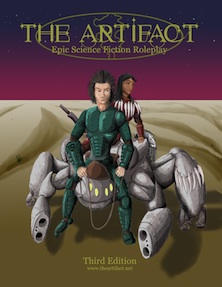For the first time GM that first game can be difficult but not because of the reasons you might imagine. It’s not usually a mastery of the rules or a compelling story that makes things hard. It’s usually more mundane things like time management and judging what the player characters can handle that trips up the first time GM.
For the first game start simple. Don’t do anything complicated. A simple encounter can be all that’s needed. If you think you’ll need a map for the game, get it ready before you get together to play. Part of the GM’s job is pre planning, you may learn to make up games on the fly later but for your first game it’s good to pre plan. You also may also have to adjust what you plan if the players have not made characters yet.
The Characters
For the first game the players will need characters. In a good number of games the process of character generation can be slow and possibly crunchy (meaning a lot of numbers to crunch). Even if the system for making characters is not difficult, players usually have to make choices, which means reviewing the options. Some players will move quickly with making decisions because they know what they want. Others will languish over options that may or may not have any real effect on their character.
Unless a system is very “rules lite” usually meaning there’s some core mechanic and the rest is left up to the GM and players, character creation could take an hour or more for three to six players. That’s really okay, most players enjoy making characters. It’s a creative process that often has unusual results. Don’t rush it to get into the game, let the process be part of the fun. The role of the GM at this stage is limited, usually to answering questions on how things are supposed to work. That’s fine but at this stage it’s a good idea to be watching what choices the players are making and what interests them. That can help inform you later on what they will find fun.
This is also the time to ask the players what they think of their characters. If their reaction is positive, ask them what they like about the character and what they’d like to do with that character. If their reaction is negative, again ask why and if there is anything that would repair the character for them. There may be options in the game for fixing low stats, if there isn’t try and come to a solution that the player will have fun with. Sometimes adding story to a character can restore the player’s opinion of the character, sometimes it’s better to just roll up a new character if the player isn’t going to enjoy playing.
On To The Fun!
I do mean that, I’m going to make a suggestion that is a bit anti-story but don’t think I’m against having a good story for the game. Don’t worry about a lot of explanation of back story and even skip over that scene where the players get offered the job that will lead to adventure.
Remember that part of the game that you looked and and said “Yeah this will be fun”? Skip right to that. Let the players know you’ll be doing this but skip to it. Get the players into the most fun part of the game you imagined right away.
After they’re done with it, retroactively explain how they got in that situation. Obviously the crazier the action the harder it will be to just explain it away but it shouldn’t be impossible. They don’t have to have amnesia or any of those tropes, just tell them they’re getting the story out of order so they can skip straight to the fun.
So why do it this way? One, the players just got off a slow process of making characters. They’re ready to go, you don’t want to tell them a long dissertation on the game they’re going to play. Two, it limits the number of monkey wrenches they can throw in the game and believe me, any monkey wrenches a player has at their disposal will be thrown. You don’t need that on the first game. You will have to learn to deal with it later though. It actually starts to get to be fun when you get used to it.
In any game, the players will have more fun if they win but don’t make it seem that they can’t lose. That will kill any sense of accomplishment they have. NPCs shouldn’t help them unless they absolutely need it. There is a lot of advice out there on not having your own “darling” NPCs that outshine the players. First time GMs are often enamored by the idea of a great über NPC to be the player’s friend that can rescue them when they need it. The problem with this is that the players don’t actually get to win, the GM wins for them and they’re just a side show.
Up Next – Your Second Game
This is where I’ll talk a bit more about making a full fledged game.


 The Free RPG Blog
The Free RPG Blog